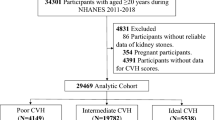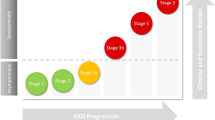Abstract
Background
Obesity causes renal problems including albuminuria. Bariatric surgery (BS) improves albuminuria. We investigated whether albuminuria is reduced by weight loss per se or by improved systemic inflammation induced by weight loss after BS.
Methods
Patients older than 18 years who received BS in Soonchunhyang University Hospital from 01 January 2011 to 31 December 2011 were included. Other inclusion criteria included body mass index (BMI) ≥ 30 kg/m2, creatinine level ≤ 1.0 mg/dL, and no overt proteinuria (trace amount or undetectable by dipstick). The patients were followed at 1 and 6 months after BS.
Results
Forty-three patients were analyzed. Three patients were men, 10 patients had diabetes, and 12 patients had hypertension. All patients had normal renal function (creatinine ≤ 1.0 mg/dL), and estimated glomerular filtration rate was 115.7 ± 16.5 mL/min/1.73 m2. There were significant reductions in body weight, BMI, high-sensitivity C-reactive protein (hs-CRP), and urine albumin-to-creatinine ratio (ACR). There were positive correlations between delta hs-CRP and delta body weight (r = 0.349, p = 0.043) or delta body mass index (BMI, r = 0.362, p = 0.035); between hs-CRP and body weight (r = 0.374, p = 0.001), BMI (r = 0.431, p < 0.001). Multivariate analysis using a linear mixed model demonstrated that hs-CRP (β = 0.5364, p = 0.026) was an independent risk factor affecting ACR.
Conclusions
Our study suggests that BS can reduce albuminuria in patients with severe obesity and normal kidney function by reducing systemic inflammation.


Similar content being viewed by others
References
Hawkins MA. Markers of increased cardiovascular risk: are we measuring the most appropriate parameters? Obes Res. 2004;12(Suppl 2):107s–14s.
Clinical guidelines on the identification, evaluation, and treatment of overweight and obesity in adults—the evidence report. Obes Res. 1998;6(Suppl 2):51s–209s.
Wahba IM, Mak RH. Obesity and obesity-initiated metabolic syndrome: mechanistic links to chronic kidney disease. Clin J Am Soc Nephrol. 2007;2(3):550–62.
Wing RR. Long-term effects of a lifestyle intervention on weight and cardiovascular risk factors in individuals with type 2 diabetes mellitus: four-year results of the Look AHEAD trial. Arch Intern Med. 2010;170(17):1566–75.
Buchwald H, Avidor Y, Braunwald E, et al. Bariatric surgery: a systematic review and meta-analysis. JAMA. 2004;292(14):1724–37.
Navarro-Diaz M, Serra A, Lopez D, et al. Obesity, inflammation, and kidney disease. Kidney Int Suppl. 2008;111:S15–8.
de Jong PE, Verhave JC, Pinto-Sietsma SJ, et al. Obesity and target organ damage: the kidney. Int J Obes Relat Metab Disord. 2002;26(Suppl 4):S21–4.
Serra A, Romero R, Lopez D, et al. Renal injury in the extremely obese patients with normal renal function. Kidney Int. 2008;73(8):947–55.
Bahrami H, Bluemke DA, Kronmal R, et al. Novel metabolic risk factors for incident heart failure and their relationship with obesity: the MESA (Multi-Ethnic Study of Atherosclerosis) study. J Am Coll Cardiol. 2008;51(18):1775–83.
Ibsen H, Olsen MH, Wachtell K, et al. Reduction in albuminuria translates to reduction in cardiovascular events in hypertensive patients with left ventricular hypertrophy and diabetes. J Nephrol. 2008;21(4):566–9.
Ibsen H, Olsen MH, Wachtell K, et al. Reduction in albuminuria translates to reduction in cardiovascular events in hypertensive patients: losartan intervention for endpoint reduction in hypertension study. Hypertension. 2005;45(2):198–202.
Navarro-Diaz M, Serra A, Romero R, et al. Effect of drastic weight loss after bariatric surgery on renal parameters in extremely obese patients: long-term follow-up. J Am Soc Nephrol. 2006;17(12 Suppl 3):S213–7.
Bolignano D, Zoccali C. Effects of weight loss on renal function in obese CKD patients: a systematic review. Nephrol Dial Transplant. 2013;28(Suppl 4):iv82–98.
Huan Y, Tomaszewski JE, Cohen DL. Resolution of nephrotic syndrome after successful bariatric surgery in patient with biopsy-proven FSGS. Clini Nephrol. 2009;71(1):69–73.
Alexander JW, Goodman HR, Hawver LR, et al. Improvement and stabilization of chronic kidney disease after gastric bypass. Surg Obes Relat Dis. 2009;5(2):237–41.
Pi-Sunyer X, Blackburn G, Brancati FL, et al. Reduction in weight and cardiovascular disease risk factors in individuals with type 2 diabetes: one-year results of the look AHEAD trial. Diabetes Care. 2007;30(6):1374–83.
Wickman C, Kramer H. Obesity and kidney disease: potential mechanisms. Semin Nephrol. 2013;33(1):14–22.
Neff KJ, Frankel AH, Tam FW, et al. The effect of bariatric surgery on renal function and disease: a focus on outcomes and inflammation. Nephrol Dial Transplant. 2013;28(Suppl 4):iv73–82.
World Health Organization. The Asia-Pacific perspective: redefining obesity and its treatment. Sydney: Health Communications Australia; 2000.
Levey AS, Stevens LA, Schmid CH, et al. A new equation to estimate glomerular filtration rate. Ann Intern Med. 2009;150(9):604–12.
Kim EY, Kim YJ. Does bariatric surgery really prevent deterioration of renal function? Surg Obes Relat Dis. 2016;12(4):856–61.
Agrawal V, Krause KR, Chengelis DL, et al. Relation between degree of weight loss after bariatric surgery and reduction in albuminuria and C-reactive protein. Surg Obes Relat Dis. 2009;5(1):20–6.
Fenske WK, Dubb S, Bueter M, et al. Effect of bariatric surgery-induced weight loss on renal and systemic inflammation and blood pressure: a 12-month prospective study. Surg Obes Relat Dis. 2013;9(4):559–68.
Scheven L, Joosten MM, de Jong PE, et al. The association of albuminuria with tubular reabsorption of uric acid: results from a general population cohort. J Am Heart Assoc. 2014;3(2):e000613.
Ballantyne GH, Gumbs A, Modlin IM. Changes in insulin resistance following bariatric surgery and the adipoinsular axis: role of the adipocytokines, leptin, adiponectin and resistin. Obes Surg. 2005;15(5):692–9.
Niskanen LK, Haffner S, Karhunen LJ, et al. Serum leptin in obesity is related to gender and body fat topography but does not predict successful weight loss. Eur J Endocrinol. 1997;137(1):61–7.
Czupryniak L, Pawlowski M, Kumor A, et al. Predicting maximum Roux-en-Y gastric bypass-induced weight reduction—preoperative plasma leptin or body weight? Obes Surg. 2007;17(2):162–7.
Mavri A, Stegnar M, Sabovic M. Do baseline serum leptin levels predict weight regain after dieting in obese women? Diabetes Obes Metab. 2001;3(4):293–6.
Acknowledgments
This research was supported by the Basic Science Research Program through the National Research Foundation of Korea (NRF) funded by the Ministry of Education (2015R1A6A1A03032522) and Soonchunhyang University Research Fund.
Author information
Authors and Affiliations
Corresponding author
Ethics declarations
Conflict of Interest
All authors declare that they have no conflicts of interest.
Ethical Statement and Consent Statement
The study protocol was approved by the Institutional Review Board of Soonchunhyang University Cheonan Hospital (IRB No. SCHCA_IRB_2011-78). All patients provided their written informed consent.
Rights and permissions
About this article
Cite this article
Park, S., Kim, Y.J., Choi, Cy. et al. Bariatric Surgery can Reduce Albuminuria in Patients with Severe Obesity and Normal Kidney Function by Reducing Systemic Inflammation. OBES SURG 28, 831–837 (2018). https://doi.org/10.1007/s11695-017-2940-y
Published:
Issue Date:
DOI: https://doi.org/10.1007/s11695-017-2940-y




